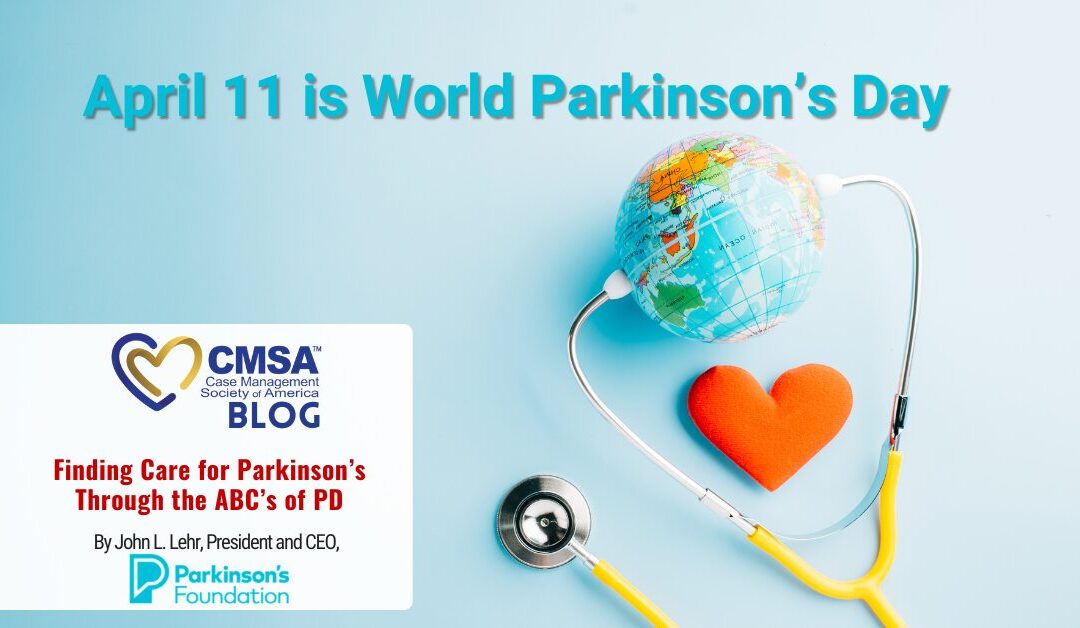By John L. Lehr, President and CEO, Parkinson's Foundation
April is Parkinson's Awareness Month. All month, the Parkinson's Foundation has been sharing information about how to find care and support for nearly one million people living with Parkinson's disease (PD) in the U.S.
This year, the Parkinson's Foundation created the ABCs of Parkinson's to raise awareness of the disease's complexity and diversity. Every person's experience with PD is unique, as are their symptoms, progression, and treatment plan. Throughout April, the ABCs of PD will highlight 26 different aspects of Parkinson's and ways to live well with the disease.
E for Early Signs
PD is a progressive neurological disorder that primarily affects people aged 60 and older. While it can be hard to identify Parkinson's initially, several early signs may point towards a diagnosis. No single sign is a cause for concern; however, if a client is experiencing more than one, consider recommending they see a doctor.
The earlier someone is diagnosed with Parkinson's, the sooner they can get connected to treatment, resources, and support.
Here are the top 10 early signs of Parkinson's:
- Tremor
- Small Handwriting
- Loss of Smell
- Trouble Sleeping
- Trouble Moving or Walking
- Constipation
- A Soft or Low Voice
- Masked Face
- Dizziness or Fainting
- Stooping or Hunching Over
K for Knowledge
People with PD and their loved ones must be informed about Parkinson's and ways to navigate life with PD best. Encourage your clients with PD to educate themselves about managing their physical and mental well-being.
The Parkinson's Foundation PD Library is full of educational resources that can help clients stay informed about the latest Parkinson's information in whatever format works best for them—from books and fact sheets to webinars and podcast episodes.
Additionally, the Foundation offers accredited courses for healthcare providers through its Learning Lab. These courses aim to provide best-practice, quality care training for providers who treat people with PD and cover various essential topics to fit your unique schedule and professional needs.
H for Hospital Safety
Every year, more than 300,000 people with PD receive hospital care in the U.S. Once hospitalized, whether planned or unplanned, people with PD are at risk of experiencing complications that lead to more extended stays and a worsening of symptoms.
People with Parkinson's and their loved ones must be aware of these risks and prepare for a hospital stay in advance. Encourage your clients to order or download the free Hospital Safety Guide to understand better how to advocate for their care needs.
During a hospital stay, the most common risks for people with Parkinson's are:
- Parkinson's medications given at a new or different time of the day
- Parkinson's medication doses that are often delayed or missed
- Being prescribed medications that worsen symptoms
- Limited movement opportunities
Parkinson's Awareness Month is an exciting time to learn more about supporting and guiding clients towards living well with Parkinson's. To learn more about caring for people living with PD and their loved ones, visit Parkinson.org.
You are invited to the Case Management Event of the Year, #CMSA2024, in Providence, RI! Join us from June 4-7 for an unforgettable experience filled with unparalleled education, top-notch networking, and an unprecedented offering of 75+ CEs: ![]() https://buff.ly/3TGdkdG Dive into a wealth of knowledge, elevate your skills, connect with leaders in the field, and stay ahead in the dynamic world of case management. But wait, there's more! All main conference sessions will be recorded, giving you until July 31 to evaluate at your own pace. Secure your spot today and be part of the future of healthcare powered by case management.
https://buff.ly/3TGdkdG Dive into a wealth of knowledge, elevate your skills, connect with leaders in the field, and stay ahead in the dynamic world of case management. But wait, there's more! All main conference sessions will be recorded, giving you until July 31 to evaluate at your own pace. Secure your spot today and be part of the future of healthcare powered by case management.
Bio: John L. Lehr guides the overall Foundation’s strategy of mission programs and resources that make life better for people with Parkinson’s. He works to expand the Foundation’s reach, research initiatives and presence, while working to improve health equity among the Parkinson’s community. He ensures that all Foundation programs and resources aim to improve care and advance research toward a cure.

